
Candida Martinelli's Italophile Site

Main
Page This family-friendly site celebrates Italian culture for the enjoyment of children and
adults. Site-Overview
Tempers
of gondoliers and Italians
Comments on he and his newlywed wife's first view of Venice, when
arriving early one still dark morning, and a gondola
transports them over the dark canals to their hotel. For I think there can
be nothing else in the world so full of glittering and exquisite
surprise, as that first glimpse of Venice which the traveler catches as
he issues from the railway station by night, and looks upon her peerless
strangeness. ... Then on either hand I
saw stately palaces rise gray and lofty from the dark waters, holding
here and there a lamp against their faces, which brought balconies, and
columns, and carven arches into momentary relief, and threw long streams
of crimson into the canal. I could see by that
uncertain glimmer how fair was all, but not how sad and old; and so,
unhaunted by any pang for the decay that afterward saddened me amid the
forlorn beauty of Venice, I glided on. ... Dark, funereal barges
like my own had flitted by, and the gondoliers had warned each other at
every turning with hoarse, lugubrious cries; the lines of balconied
palaces had never ended;--here and there at their doors larger craft
were moored, with dim figures of men moving uncertainly about on
them. At last we had passed
abruptly out of the Grand Canal into one of the smaller channels, and
from comparative light into a darkness only remotely affected by some
far-streaming corner lamp. But always the pallid, stately palaces;
always the dark heaven with its trembling stars above, and the dark
water with its trembling stars below; but now innumerable bridges, and
an utter lonesomeness, and ceaseless sudden turns and windings. The
Place of St. Mark is the heart of Venice, and from this beats her life
in every direction through an intricate system of streets and canals
that bring it back again to the same centre. So, if
the slightest uneasiness had attended the frequency with which I lost my
way in the city at first, there would always have been this comfort:
that the place was very small in actual extent, and that if I continued
walking I must reach the Piazza sooner or later. There is
a crowd constantly tending to and from it, and you have but to take this
tide, and be drifted to St. Mark's--or to the Rialto Bridge, whence it
is directly accessible. Of all the open spaces in the city, that before
the Church of St. Mark alone bears the name of Piazza, and the rest are
called merely _campi_, or fields.
Describing
the Caffé Life around St. Mark's By all odds, the
loungers at Florian's were the most interesting, because they were the
most various. People of all shades of politics met in the dainty little
saloons, though there were shades of division even there, and they did
not mingle. The Italians carefully
assorted themselves in a room furnished with green velvet, and the
Austrians (ed. Venice was under Austrian control at this time, to the
great frustration of the national-unity-minded Italians) and the
Austriacanti (ed. those who favored Austrian tutelage) frequented a
red-velvet room. They were curious to
look at, those tranquil, indolent, Italian loafers, and I had an
uncommon relish for them. They seldom spoke together, and when they did
speak, they burst from silence into tumultuous controversy, and then
lapsed again into perfect silence. The elder among them
sat with their hands carefully folded on the heads of their sticks (ed.
walking sticks), gazing upon the ground, or else buried themselves in
the perusal of the French journals. By chance I found them
playing chess, but very rarely. They were all well-dressed, handsome
men, with beards carefully cut, brilliant hats and boots, and
conspicuously clean linen. I used to wonder who they were, to what order
of society they belonged, and whether they, like my worthless self, had
never any thing else but lounging at Florian's to do; but I really know
none of these things to this day. Some men in Venice
spend their noble, useful lives in this way, and it was the proud reply
of a Venetian father, when asked of what profession his son was, "E
in Piazza!" That was, he bore a cane, wore light gloves, and
stared from Florian's windows at the ladies who went by.
Comments
on the outdoor Italian lifestyle in Venice We say, in a cheap and
careless way, that the southern peoples have no homes. But this is
true only in a restricted sense, for the Italian, and the Venetian
especially, makes the whole city his home in pleasant
weather. No one remains under a
roof who can help it; and now, as I said before, the fascinating
out-door life begins. All day long the people sit and drink coffee and
eat ices and gossip together before the Caffé, and the soft midnight
sees the same diligent idlers in their places. The promenade is at
all seasons the favorite Italian amusement; it has its rigidly fixed
hours, and its limits are also fixed: but now, in spring, even the
promenade is a little lawless.... "E
la stagion che ognuno s'innamora;" (ed. It is the season in which
everyone falls in love.) and now young girls steal to their balconies,
and linger there for hours, subtly conscious of the young men sauntering
to and fro, and looking up at them from beneath. Now, in
the shady little courts, the Venetian housewives, who must perforce
remain indoors, put out their heads and gossip from window to window;
while the pretty water-carriers, filling their buckets from the wells
below, chatter and laugh at their work. Every
street down which you look is likewise vocal with gossip; and if the
picturesque projection of balconies, shutters, and chimneys, of which
the vista is full, hide the heads of the gossipers, be sure there is a
face looking out of every window for all that, and the social, expansive
presence of the season is felt there.
Comments
on the Venetian Campi (small squares)
Comments on the beauty of Venice And if, living
constantly in Venice, you sometimes for a little while forget how
marvelous she is, at any moment you may be startled into vivid
remembrance. The cunning city beguiles you street by street, and
step by step, into some old court, where a flight of marble stairs leads
high up to the pillared gallery of an empty palace, with a climbing vine
green and purple on its old decay, and one or two gaunt trees stretching
their heads to look into the lofty windows,--blind long ago to their
leafy tenderness,--while at their feet is some sumptuously carven well,
with the beauty of the sculptor's soul wrought forever into the
stone. Or Venice lures you in a gondola into one of her remote
canals, where you glide through an avenue as secret and as still as if
sea-deep under our work-day world; where the grim heads carven over the
water-gates of the palaces stare at you in austere surprise.... ...one
morning we were roused from our breakfast by a wild and lamentable
outcry. Two large boats, attempting to enter the small canal
opposite at the same time, had struck together with a violence that
shook the boatmen to their inmost souls. One
barge was laden with lime, and belonged to a plasterer of the city; the
other was full of fuel, and commanded by a virulent rustic. These rival
captains advanced toward the bows of their boats, with murderous looks,
and there stamped furiously, and beat the wind with hands of deathful
challenge, while I looked on with that noble interest which the
enlightened mind always feels in people about to punch each other's
heads. But the storm burst in words. "Figure
of a pig!" shrieked the Venetian, "you have ruined my boat
forever!" "Thou
liest, son of an ugly old dog!" returned the countryman, "and
it was my right to enter the canal first." They
then, after this exchange of insult, abandoned the main subject of
dispute, and took up the quarrel laterally and in detail.
Reciprocally questioning the reputation of all their female relatives to
the third and fourth cousins, they defied each other as the offspring of
assassins and prostitutes. As the
peace-making tide gradually drifted their boats asunder, their anger
rose, and they danced back and forth and hurled opprobrium with a foamy
volubility that quite left my powers of comprehension behind. At
last the townsman, executing a pas seul of uncommon violence,
stooped and picked up a bit of lime, while the countryman, taking
shelter at the stern of his boat, there attended the shot. I now
know that these people never intended to do more than quarrel, and no
doubt they parted as well pleased as if they had actually carried broken
heads from the encounter. But at the time I felt affronted and
trifled with by the result, for my disappointments arising out of the
dramatic manner of the Italians had not yet been frequent enough to
teach me to expect nothing from it. More
excepts from Venetian Life by W. D. Howells on: Italian
theatre in the 1860s in Venice Italian
food in Venice in the 1860s and new-fangled restaurants More on W. D. Howells at the William
Dean Howells Society site.
My list of books by and/or about William Dean Howells available
at Amazon.com

Venice
in the 1860s, from Venetian Life by W. D. Howells
![]()
William
Dean Howells, a prominent American writer until his death in 1920, lived
with his newlywed wife in Venice from 1861 to 1865 where he filled the
post of U. S. Consul in Venice under President Lincoln.
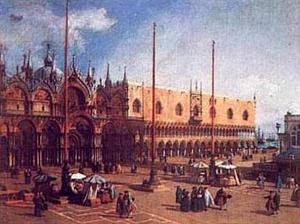 Comments
on St. Mark's Square in the heart of Venice
Comments
on St. Mark's Square in the heart of Venice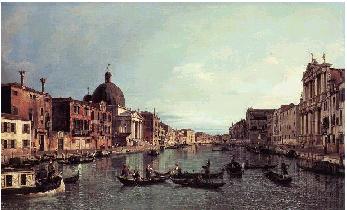 The younger stood a
good deal about the doorways, and now and then passed a gentle, gentle
jest with the elegant waiters in black coats and white cravats, who
hurried to and fro with the orders, and called them out in strident
tones to the accountant at his little table; or sometimes these young
idlers make a journey to the room devoted to ladies and forbidden to
smokers, looked long and deliberately in upon its loveliness, and then
returned to the bosom of their taciturn companions.
The younger stood a
good deal about the doorways, and now and then passed a gentle, gentle
jest with the elegant waiters in black coats and white cravats, who
hurried to and fro with the orders, and called them out in strident
tones to the accountant at his little table; or sometimes these young
idlers make a journey to the room devoted to ladies and forbidden to
smokers, looked long and deliberately in upon its loveliness, and then
returned to the bosom of their taciturn companions. 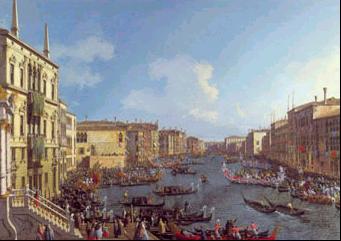 Comments
on Springtime in Venice
Comments
on Springtime in Venice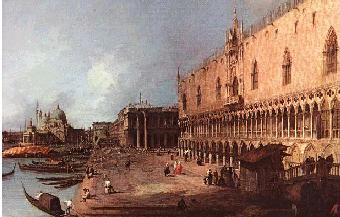 Comments
on the tempers of Venice's gondoliers, and Italians in general
Comments
on the tempers of Venice's gondoliers, and Italians in general
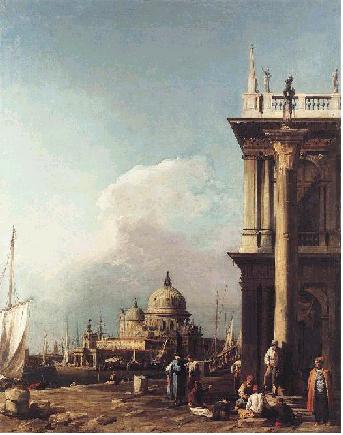 To my
infinite disappointment it was not fired. The Venetian seemed to
have touched the climax of his passion in the mere demonstration of
hostility, and gently gathering up his oar gave the countryman the right
of way. The courage of the latter rose as the danger passed, and
as far as he could be heard, he continued to exult in the wildest
excesses of insult: "Ah-heigh! brutal executioner! Ah,
hideous headsman!" Da capo.
To my
infinite disappointment it was not fired. The Venetian seemed to
have touched the climax of his passion in the mere demonstration of
hostility, and gently gathering up his oar gave the countryman the right
of way. The courage of the latter rose as the danger passed, and
as far as he could be heard, he continued to exult in the wildest
excesses of insult: "Ah-heigh! brutal executioner! Ah,
hideous headsman!" Da capo.